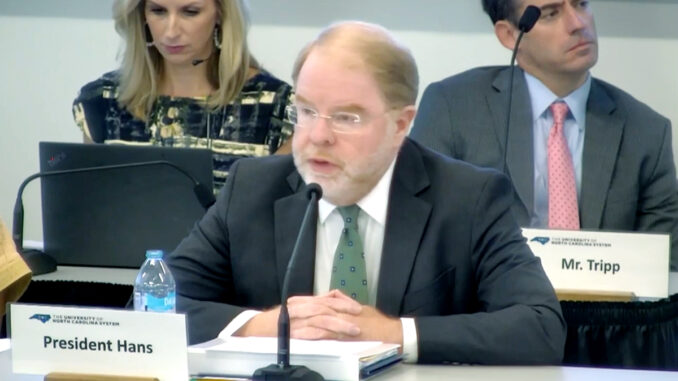

RALEIGH — In a year when many universities across the nation are still feeling the aftershocks of pandemic-era enrollment drops, the University of North Carolina System is experiencing a rising tide. From Western Carolina to UNC Wilmington, there are nearly a quarter million students now navigating the halls of the state’s public universities. According to a release this week from the UNC System, enrollment across the 17-campus system is up 2.2% from last year and 3.5% since 2022.
The growth aligns with national figures, which show a 2.5% increase in undergraduate enrollment for Spring 2024, according to recent data from the National Student Clearinghouse Research Center. All institutions within the UNC System reported an increase in enrollment, with transfer enrollment seeing a significant 7.8% rise over last year. UNC System campuses added more than 5,400 students this fall.
North Carolina Central, UNC Wilmington and Elizabeth City State led the system with the highest growth rates at 7.7%, 4.7% and 4.3%, respectively. Meanwhile, Winston-Salem State (0.1%), Western Carolina (0.5%), UNC Pembroke (0.6%), UNC Chapel Hill (0.6%) and East Carolina (0.6%) saw more modest increases. NC State, which remains the largest campus by undergraduate enrollment, experienced a 3.1% increase.
“We’ve worked hard to keep higher education affordable, to make sure students are graduating with great prospects and less debt,” said UNC System President Peter Hans. “Our universities are focused on delivering a valuable education that’s truly accessible for the people of this state, and that message is getting across.”
The system’s growth strategy has centered on maintaining low tuition rates, implementing student support programs, improving financial aid, enhancing transfer programs and expanding online learning opportunities.
David English, the UNC System’s senior vice president for academic affairs, emphasized the long-term nature of their approach.
“We’ve been preparing for a more challenging demographic environment for a long time,” said English. “We need to reach a larger share of our high school graduates, make it easier for community college students to transfer, and make financial aid easier to access and understand. That’s long-range work, but you see it reflected in these enrollment numbers.”
The system’s Historically Black Colleges and Universities (HBCUs) have contributed significantly to the enrollment increase, reflecting a broader national trend. North Carolina A&T, now the largest HBCU in the country, reported an enrollment exceeding 14,000 students. North Carolina Central experienced a 7.7% increase, pushing its enrollment to 8,579 this fall.
The gains at North Carolina’s HBCUs align with a national resurgence in HBCU enrollment. According to recent data, many HBCUs across the country have seen substantial growth in recent years, even as overall college enrollment faced challenges. Factors contributing to the growth include increased interest following racial justice movements, new sources of funding and initiatives by the institutions intended to boost enrollment and graduation rates.
The UNC System’s HBCU growth is partly attributed to changes in policy that allow more out-of-state students at campuses with strong demand and open capacity. “Our public HBCUs are tremendous assets for North Carolina, and they’re bringing in talented students from across the country,” Hans said. “That’s great news for those schools and for the state’s economy.”
The system has also introduced new financial aid initiatives. The Next NC Scholarship aims to cover more than half of tuition and fees at any public university for North Carolina residents from households making $80,000 or less. The system has also launched a pilot program called NC College Connect to simplify admissions at some universities and encourage more qualified high school graduates to pursue college degrees.




